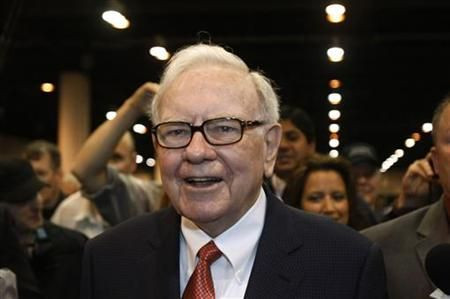Why is Berkshire Hathaway Planning to Buy Back Shares?
ANALYSIS

Speculation has arisen over why Warren Buffett chose to enact a share buyback of Berkshire Hathaway shares for the first time in living memory.
Certainly the shares makes for a good buy -- having dropped nearly 24 percent since late February. Moreover, given the huge amount of cash the conglomerate holds, repurchasing shares might be one of the best methods of redeploying all that bounty.
“The underlying businesses of Berkshire are worth considerably more than this amount [that shares are trading at],” the company said in a statement on Monday. “If we are correct in our opinion, repurchases will enhance the per-share intrinsic value of Berkshire shares.”
Class A shares of Berkshire Hathaway rose eight percent on Monday, to $108,449, but the shares are still down 10 percent so far this year. Share repurchases typically lead to an increase in earnings-per-share, and higher EPS typically lead to higher stock prices.
Timothy Vick, a senior portfolio manager at Sanibel Captiva Trust Co. in Sanibel, Fla., told MarketWatch: “This is a clear signal that Buffett believes there’s significant value not being recognized by the market, If he puts $10 billion or more into the buyback, it won’t be the highest return, but it’ll be the best return for this level of safety.”
Others have pondered that perhaps Buffett – who is now 81 years old – is simply preparing for his exit and planning to bequeath his legendary company’s management to younger warriors.
"This is a piece of the unfolding introduction of life after Buffett. Under him, cash has had such a high value and going forward those maestro opportunities will be reduced," Thomas Russo, a partner at Gardner Russo & Gardner in Lancaster, Pa., told MarketWatch.
Over the past year, Buffett has hired hedge fund manager Todd Combs as Berkshire’s chief investment officer and another hedge fund specialist Ted Weschler as portfolio manager.
However, Berkshire cautioned that its largesse wouldn't be indefinite. While the company indicated it will buy back Class-A and Class-B shares at prices of up to a 10 percent premium above book value, it'll maintain a cash balance of at least $20 billion. Berkshire has about $48 billion cash on hand.
Moreover, a buyback may signal that Buffett sees little value elsewhere in the stock market.
Sean M. Snaith, an economist at the University of Central Florida, told International Business Times: “Given all the cash that Berkshire is sitting on, perhaps this was the best opportunity out there right now. After the Bank of America investment perhaps they were looking for something a little less risky.”
Berkshire is a unique corporation comprised of a batch of companies and in recent years it has gotten larger.
Over the past year and a half, Berkshire acquired $5 billion of Bank of America Corp. preferred shares; spent $9 billion for Lubrizol Corp. and $26 billion for Burlington Northern Santa Fe Railroad.
Howard Silverblatt, senior index strategist at Standard & Poor’s, told IB Times that historically Berkshire hasn't done buybacks, and the company's last dividend was in 1962, for 10 cents per share.
“Their board’s authorization [Monday], permitting management to do buybacks, were in the typical Berkshire style, short with few details,” he said.
“However, it does state that repurchases will enhance the preshare intrinsic value, leading me to believe that they would be doing share count reduction, which few companies are doing now. Most are keeping up with shares issued for options and dividend reinvestment programs, and not reducing share count.”
© Copyright IBTimes 2025. All rights reserved.





















